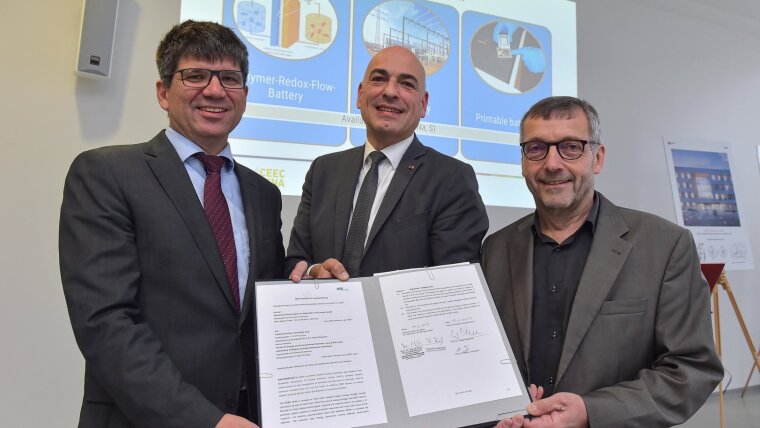
Published: | By: Katja Bär
Friedrich Schiller University Jena and Helmholtz-Zentrum Berlin für Materialien und Energie (HZB) have laid the foundation for close collaboration with the signing of a Memorandum of Understanding at 19. September. The Centre for Energy and Environmental Chemistry Jena (CEEC Jena) and HZB want to join forces to research novel energy storage materials and systems in the future.
Storing energy is one of the key technologies of the 21st century, the Thüringen Minister of Science, Wolfgang Tiefensee, said at the signing. “The cooperation between the CEEC and HZB will give a new tailwind to research into novel energy stores. From the State’s perspective, it is worth working towards structural cooperation between the two institutions.”
Bundling of resources
“This cooperation allows not only the bundling of resources, but above all brings smart minds together into a project to share their knowledge and thus jointly achieve advancements in knowledge that will benefit everyone. The outstanding cooperative projects with non-university research institutions are a hallmark of Jena, and contribute significantly to the success of the university and the location,” University President, Prof. Walter Rosenthal, said after the signing of the agreement.
“The cooperation with Helmholtz-Zentrum Berlin is to be expanded further and, if it is a success, established permanently,” declares Prof. Ulrich S. Schubert, Director of the CEEC Jena.
“To start with, it is planned that scientists at the Berlin and Jena institutions will jointly research polymer-based energy stores,” explains Prof. Bernd Rech, Scientific Director of Helmholtz-Zentrum Berlin für Materialien und Energie. HZB’s unique characterisation techniques will thus be used to investigate the novel batteries from Jena in detail and subsequently refine them. A specific upcoming goal is to establish a Joint Lab where the synergies can be used to maximum potential.
Funding is provided by the participating institutes. Additionally, Thüringen’s Ministry of Science has promised to provide the Friedrich Schiller University Jena with funding for personnel and material investments.
The signing of the “Memorandum of Understanding” on the cooperation was pronounced today in the presence of the Thüringen Minister of Economic Affairs, Science and Digital Society, Wolfgang Tiefensee; the President of Friedrich Schiller University Jena, Prof. Walter Rosenthal; and the Scientific Director of Helmholtz-Zentrum Berlin für Materialien und Energie, Prof. Bernd Rech.